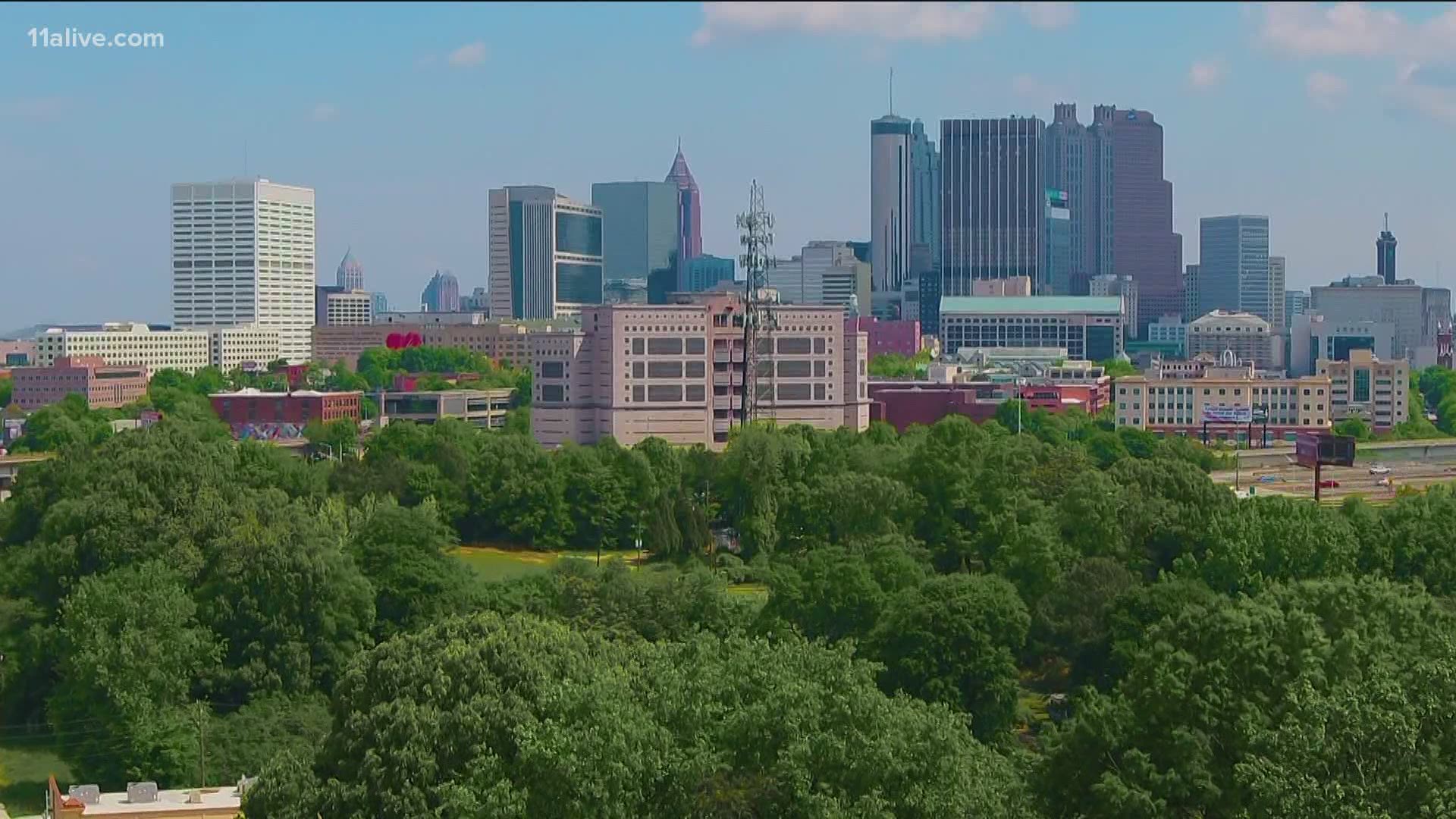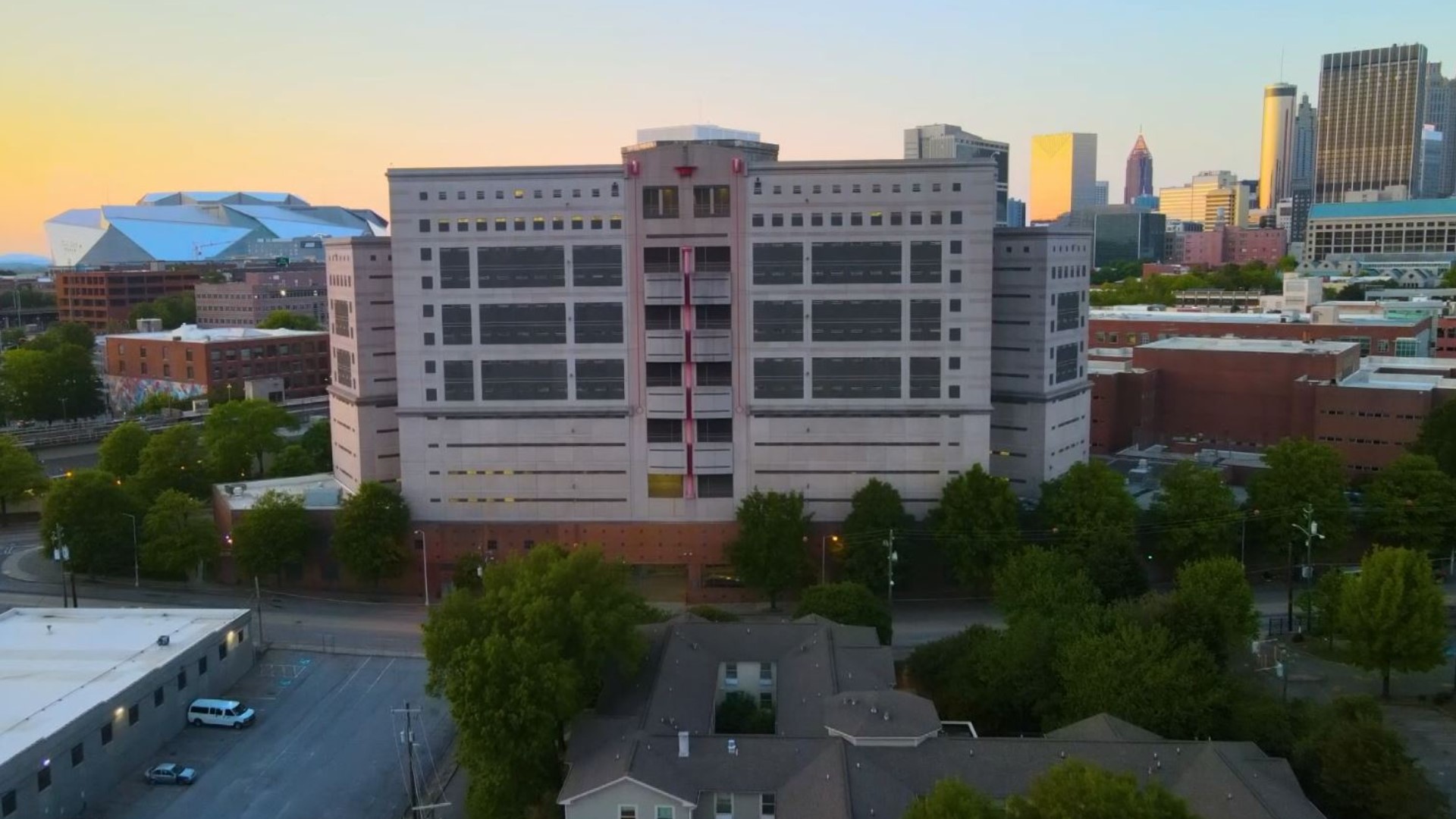ATLANTA — On May 28, 2019, Mayor Keisha Lance Bottoms stood in front of the Atlanta City Detention Center (ACDC) and announced plans to close it.
She declared that the city would “transition out of the jail business” and establish a task force to reimagine the city’s jail as a center for community services.
Two years later, the jail is still open. No plans have been passed to close it.
And now, the mayor said she will not seek re-election, meaning her timeline to complete this goal has narrowed to a few months.
RELATED: 'There are no criminals there': Community activists push for Atlanta to close the city jail
Weeks before announcing she would only serve one term, Bottoms spoke with 11Alive’s Matt Pearl for a wide-ranging conversation about the detention center and its future. Excerpts of the conversation, edited for length and clarity, are below:
Matt Pearl: What does the Atlanta City Detention Center mean to you?
Mayor Bottoms: I used to work as a prosecutor down at municipal court, so, for me, it means seeing primarily African-American men coming in by the busload, literally. It was this symbol of mass incarceration, and thankfully we’ve been able to turn the tide on that. There’s an opportunity for it to be a symbol for so much more.
Barely a month after her inauguration, Bottoms signed legislation to eliminate cash bail for nonviolent arrests. This meant people would not be held pre-trial at ACDC simply because they couldn’t afford bail.
Months later, when then-President Donald Trump came under fire for separating migrant children from their families, the mayor responded by refusing to accept any more ICE detainees. She ended the contract for good in September.
During the mayor’s first year, at its highest, ACDC averaged 488 inmates per night during the month of April. That December, the average had fallen to 92.
Matt Pearl: How has your experience as a child – and what your family went through – affected how you view this detention center now?
Mayor Bottoms: It gives me a context many people don’t have. I know what it’s like to have a family member who’s charged with a crime and be held in prison, because I experienced that with my father. But I have so many personal stories of knowing people and having family members locked up on something very simple, and then it creates this domino effect. You can’t pay a traffic fine, so you’re held in jail, and then you lose your job, and then you can’t pay your rent or your child support. It creates this never-ending cycle, which is not just the story of my experiences but of many people throughout the community, especially in the African-American community.
Matt Pearl: What would you like to see happen?
Mayor Bottoms: What I’d like to see is that this massive facility – 500,000 square feet on Peachtree Street in downtown Atlanta – no longer be this center and symbol of mass incarceration. [I would like] that it become a symbol of hope for our communities, literally and physically. It’s not the best use of taxpayer money, and there’s so much more we need in our communities. We need a place where people can have 24-hour day care. We need a place where someone can walk in and get drug counseling and support services, where they can get their GED and vocational training. There’s an opportunity to transform the jail into that place.
Matt Pearl: May 2019, you announce that Atlanta is no longer going to be in the jailing business. What is that moment like for you?
Mayor Bottoms: It was a big moment. We had so much support and goodwill for that. People were talking about criminal justice reform and wanting to do things different. Unfortunately, with the COVID crime wave, it almost seems as if we’ve done a 180 from the moment, back to the 1990s and 80s model of, “Lock ‘em all up.” Crime is up across the country. Crime is up in Atlanta. And people have a tendency to deal with what’s in front of them.
Matt Pearl: The thing I constantly hear at city council meetings is, “With a generational crime wave in Atlanta, how can we possibly close a jail?”
Mayor Bottoms: It’s a fair question to ask, but I’ll give you the example of my father. My father was not a hardened criminal. He hadn’t been to prison before. He didn’t have a record. But my father chose to sell drugs, and this was something born out of an addiction issue. How many more people have addiction issues? And before they make this extreme decision to do something unlawful, that completely goes against who they are, how about we have a place that they can walk into where they can access support services and opportunities that will allow them to make other decisions?
Matt Pearl: Can you close the jail without City Council?
Mayor Bottoms: Well, we’re going to continue to go through the legislative process. There are things I can do as mayor, and there are things we’ll need city council approval on. But meanwhile, taxpayers are still paying for a corrections staff – at last count, we were at about 2-to-1 corrections officers per inmate – and we’re paying millions of dollars to operate this building with 30 people. It’s not a place for mass incarceration.
Matt Pearl: Among advocates for closing the jail, there seems to be a critique that since COVID, since the rise in crime, they have not seen you talking about this enough. Do you think you could be doing more publicly, outwardly to talk about this?
Mayor Bottoms: I talk about it all the time. But I don’t dictate the news cycle. So if the entire country and globe is dealing with a pandemic, that’s what the news cycle and reporters like me will ask me to speak about. As the mayor of Atlanta, there’s a number of issues and challenges I’m speaking on at any given time. The jail is a very important one, but I’ve given my voice to it every opportunity I’ve had.
Matt Pearl: Is there more you can do to sway council?
Mayor Bottoms: That’s where our advocates can be helpful. I think sometimes the anger and frustration is misguided. To put the same level of expectation and pressure on council that’s been given to me at certain points would be most productive. Many people don’t even understand what the jail is. When they think of a jail, they think of a place where hardened criminals are held. The reality? These are people charged with petty crimes: expired tags, broken tail light, littering. These are not rapists and murderers that are being held in this jail.
Matt Pearl: I’ve listened to a lot of the city council’s public safety work sessions. Many of the calls are coming in from Buckhead, saying crime is out of control, people need to be locked up, and they’ve never seen Atlanta like this. What do you make of that particular strain of criticism from that particular community?
Mayor Bottoms: I think it’s unfortunate, because the person who steals your car or breaks into your house? That person will not come through the city jail. Part of it is intentional misinformation to communities and to inflame emotions, and to get people to this place of, “Lock ‘em all up.” Well, that’s not a solution. And mass incarceration across the country has shown us that’s not a solution and deterrent to crime. You’ve got to deal with the systemic issues that lead people to crime – while you address crime, which is very real.
This has all happened after COVID. This is related to people being out of work, people dying, people being in homes with potentially unsafe relationships. All of this spills out into our streets. But we can’t ignore the systemic issues and challenges that have never been addressed.
Matt Pearl: How important is the closing of the jail to your overall impact on criminal justice reform in the city of Atlanta?
Mayor Bottoms: Well, we’ve done a lot, even without closing the jail. But this is a huge piece – a cornerstone of our criminal justice reform.
Our administration has done more than any administration in the history of this city to get us where we are on criminal justice reform. I understand the frustration, because for our advocates, it’s not happening fast enough. But they have to think about how far we have come, and how long they’ve been trying to make this happen. We’ve made progress. And I can tell you, before I became mayor, there was no progress being made. There was a lot of talk and a lot of frustration. The progress is being made, and we’re gonna keep pushing.


